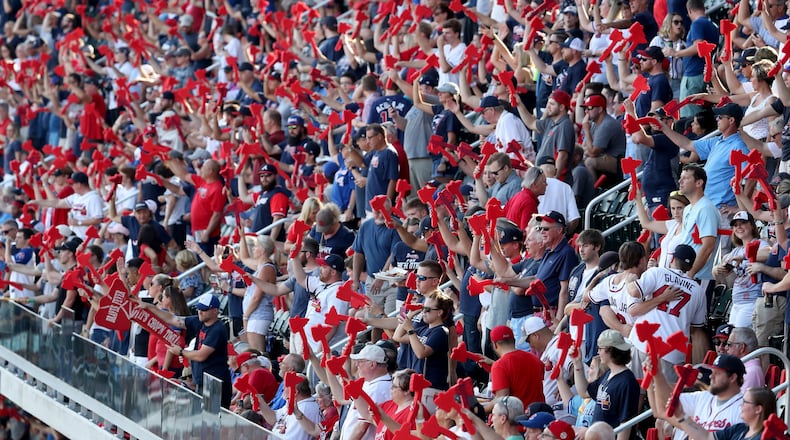All right, it’s done — the tomahawk chop, that is. It was fun and fresh at the beginning, way back in 1991, when the Atlanta Braves were a worst-to-first surprise success and a shared civic fervor.
But today it is tired and trite — kind of like hearing a Ramones tune on TV selling life insurance.
It’s not so much that it’s terribly politically incorrect. It just makes us look like rubes. And we inhabitants of this International Olympic City don’t want to look like rubes, do we?
I know, this whole thing is emotional. Somewhere in my basement is a Polaroid of me and Chief Noc-A-Homa in a tavern, chopping for the camera. There's a resistance to giving up what's warm, fuzzy and familiar, like the feel of a cheap foam tomahawk clutched in your sweaty palm as you root for a Braves rally.
The Braves, a team I used to love, are now in sadly familiar territory, having blown another series-deciding game, this time in historically (hysterically?) brutal fashion.
The 10-run first inning in Game 5 was the type of beating that I remember enduring in peewee baseball. Except there is no slaughter rule in the Major Leagues because they still have nine innings of beer, hot dogs and souvenirs to sell. So they had to slog on with the game while sullen fans took to Twitter to assign blame.
And what was the cause of our collective catastrophe? A young starting pitcher not ready for prime time? No, some argued, it was karma brought on by the Braves’ decision to forgo the chop because some St. Louis Cardinals scrub was offended. It was political correctness run amok.
Local Republicans — from Vice President Mike Pence's former aide to our Guv Lite, to the Tea Party Lady to radio blabber Erick Erickson — used the moment to go on the warpath and score some easy cultural points by saying the weak-kneed Braves were getting their just deserts.
A week ago, Cardinals pitcher Ryan Helsley, a member of the Cherokee Nation, told his local newspaper, the St. Louis Post-Dispatch, that the tomahawk chop was "disrespectful." He said it paints American Indians as a kind of "caveman-type people" who "aren't intellectual."
“It’s not me being offended by the whole mascot thing. It’s not,” Helsley told the Post-Dispatch. “It’s about the misconception of us, the Native Americans, and how we’re perceived in that way, or used as mascots. The Redskins and stuff like that.”
The Braves, like any big organization in these sensitive times, backed off and did not distribute the foam tomahawks on each seat or play music to pump up the local warriors in the stands.
“We look forward to a continued dialogue with those in the Native American community after the postseason concludes,” the Braves said in an announcement.
Well, a little history here: That dialogue goes back 28 years. I remember being in the stands at Atlanta-Fulton County Stadium (that’s two new ballparks ago) when the tomahawk chop was an organic, communal offering.
The first mention of the tomahawk chop in the pages of The Atlanta Journal-Constitution came in late July 1991. The chop was appropriated from our neighbors to the south — Florida, that is. Some alumni of Florida State University were at a Braves game and started chopping and chanting in an FSU Seminole fashion to catch the attention of young Atlanta outfielder and two-sport star Deion Sanders, an alumnus of that school.
On Aug. 1, 1991, ancient sports scribe Furman Bisher caught on, writing, “The athletic spectators are giving out with the tomahawk thrust, an indelicate exercise stolen from (Sanders’) old school, Florida State.”
Then-Braves organist Carolyn King, a 21-year-old Clark Atlanta University student, hit the A and G keys to add a little Indian-flavored background beat and the chop took off.
Soon it was everywhere. The AJC’s Peach Buzz column even noted that an aerobics instructor was incorporating it into her class. Ted Turner, who owned the Atlanta Braves at that time, Jane Fonda and even Jimmy Carter were seen doing the chop, or variations of it.
But there was pushback. I also remember standing outside the ballpark interviewing Native American protesters who had a platform and TV cameras when the Braves made it to the playoffs and the World Series. The chop was just cheesy and stupid, one protester told me.
The Braves of 1991 lost the World Series in a seventh-game heartbreaker but still got a parade. After things cooled down, Turner told a reporter that he would not change the name of the Braves. “It’s a compliment. Braves are warriors,” he said.
The chop? That was different, he said: “We’re working on that. I’d like to see something done to get rid of the chop, and if I could do it myself, I would.”
Nothing ever became of it, however, and the chop was soon interwoven into the Braves’ fabric and even became a selling point: Chop House anyone?
It’s not terribly offensive, many say. Even to some Native Americans. A leader from the Navajo Nation was asked about the tomahawk chop a few years ago. He shrugged, saying, “The ignorance is just so blatantly obvious, it’s not really worth getting upset about.”
He’s probably right. It’s not so much that it’s offensive. It’s just old and worn out. Once it was organic and crowd-driven, a fire-us-up ritual for an overachieving underdog team.
Now it’s just a staged, tiresome routine by a team owned by a soulless corporation from another state to keep the throng busy while waiting for the next batter.
To those who say dropping the chop hurt the Braves, I say baloney!
We’re now closing in on 20 playoffs with the tomahawk chop chant as our backbeat. And yet, we have just one championship.
It ain’t working. Try something else.
About the Author
The Latest
Featured







